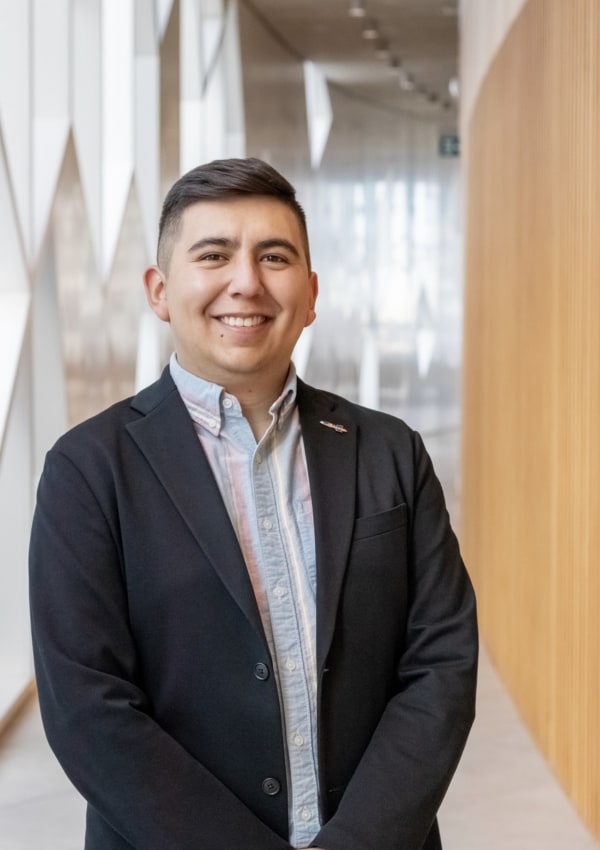On March 25 and 26, students from across campus will elect a new president of the University of Saskatchewan Students’ Union.
The president is the chief spokesperson for the union and is responsible for coordinating the executive team, representing students in the university’s Board of Governors and participating in government committees regarding student issues.
To help students make their decision for the upcoming election, the Sheaf asked the presidential candidates about their campaigns and where they stand on important issues in this election.
What does campaigning during a pandemic look like?
Campaigning during a pandemic calls for changes in strategy and has certainly impacted how each candidate is conducting their campaign.
For Akingbehin Akinwande, “it’s very different this year.”
“I like to have human interaction as opposed to a social media interface, but even at that I still love the fact that I’m reaching out to people … although it’s in a different form,” Akinwande said.
Autumn LaRose-Smith says this is hard on both candidates and students, and is worried about the impact on voter turnout.
“An online election is hard enough, let alone when the province has announced a state of emergency,” LaRose-Smith said.
“Usually you are trying to engage students and make sure you are as visible as possible,” said Carlos Muñoz Pimentel.
But the online campaigning makes this difficult. He adds that social distancing calls for a “change in tactic” from previous campaigns.
What is something unique you bring to the USSU?

Akinwande says the uniqueness of his campaign is rooted in his focus on inclusion and diversity, and always thinking of how he can be of service to others.
“I am a people’s person. I am always thinking about how I can be of service to my community,” Akinwande said. “I am running to make the USSU the union we the students need it to be.”
LaRose-Smith believes that bringing the experience of an Indigenous woman to the USSU is important.
“The other candidates have Indigenous related platform parts in their campaign, but being the only candidate that is Indigenous for president — I feel that I would have a lot better understanding of those concerns and a lot better relationship already with that student body,” LaRose-Smith said.
Muñoz Pimentel believes his years of working with the USSU set him apart from the other candidates.
“In my current role as vice-president academic [affairs], I have been able to get a lot of connections with the university community as a whole,” Muñoz Pimentel said. “So when it comes to me making sure that the platform proposed comes to fruition, it is a much easier job because I know who to get in contact with and how to get it done.”
As voters, it is important to know where candidates stand regarding decisions made by the USSU. Here are the candidates’ opinions on the USSU’s operations this year.
What is an issue the USSU could have addressed this year? What would you do differently as president?

There have been a couple of issues that Akinwande thinks the USSU could improve their approach on. Most important to him is the issue regarding international students still being ineligible to run for the USSU executive and it is one that he has been advocating for this entire academic year. For him, “inclusion is non-negotiable.”
“The reason why this [issue] was not resolved properly is because it was not a priority enough for the current administration, but for me, diversity and inclusion is priority. I would stop at nothing for it,” Akinwande said.
In her current role as vice-president student affairs, LaRose-Smith has noted gaps in communication; students have told her that they wish they knew of services and events happening on campus. To this end, she has proposed holding town halls with every single constituency of campus to hear student concerns.
“Communication is incredibly important — having people understand who the USSU is, why it is important and how you can reach out,” LaRose-Smith said. “The way I would love to communicate the importance of the USSU is through heightened collaboration with students and students groups on our campus.”
Muñoz Pimentel points to Welcome Week as an issue because it “seemed that USSU presence was not as strong as it should have been.” He believes this boils down to gauging how good engagement is between the USSU and students.
For this, Muñoz Pimentel proposes to audit all communications of the USSU with students. This audit will be used to craft a “solid” communication strategy designed to make students realize that the students’ union is there for them.
On Feb. 6, 2020, the USSU Special General Meeting was adjourned immediately after it started because it did not meet quorum. What is your stance on this and how would you work to prevent this in the future?
Akinwande was discontent with the way the SGM was handled. While he believes the quorum limit should remain, he would work to bring flexibility by means of his proposed USSU app that would allow students to decide a meeting time or make statements.
“Again, it is about meeting the students’ needs,” Akinwande said. “There should be some more flexibility in the union to accommodate students.”
When the SGM did not proceed, the students present started a town hall to share comments about the USSU. This inspired LaRose-Smith’s idea to “create more avenues” for student voices to be heard on a regular basis.
“I think that with the SGM we obviously saw the importance for students to be able to voice concerns so that our advocacy efforts can be relevant to the student body we are representing,” LaRose-Smith said.
The SGM was a “shock” to Muñoz Pimentel and it taught him a “huge lesson.”
“We only needed 50 people in that room out of a student body of 20,000 undergraduates,” Muñoz Pimentel said. “It helps you see how the USSU is not properly engaging with students.”
In October 2019, the Students’ Society of McGill University asked the USSU for a letter of support for their divestment movement. The USSU executive decided not to do so.
What is your stance on divestment from the fossil fuel sector?

“The primary role, if I am elected president, is to be an executive position representing University of Saskatchewan students,” Akinwande said. “I would consult with students, explain the issues… I’m going to work only based on feedback [received from] students.”
He acknowledges that both climate change and sustainability are very complicated issues and does not “want to make decisions that would negatively affect students here.”
Divestment is an issue that LaRose-Smith has discussed with members of the student body in the past. For her, it is about transparency.
“I understand that simply divesting is a much more complicated concern, however, I think that in regards to transparency — if we are not fully able to divest, students should still know where their money and fees are going in regards to investments. And what types of investments are being made and who we are working with,” LaRose-Smith said.”
Muñoz Pimentel is in support of divestment, especially in light of the university’s focus on sustainability.
“I want to push administration in knowing where their investments are and trying to see if there is a better way,” Muñoz Pimentel said. “After all, this is our planet and we have to protect it and make sure that investments into the fossil fuel industry are definitely reduced, if not eliminated.”
In the election last year, voter turnout was 9.34 per cent and it continued the 10-year running trend of candidates being uncontested. How will you increase voter turnout?
Akinwande acknowledges student engagement is poor due to students being so busy; he says the “primary objective is not to get students engaged only with the union,” instead it is to meet their needs. He points to his proposed USSU app that would include the student bus pass, event information and budgets as a tool to increase transparency and accessibility with the union.
“If students see that the union works for them, they feel their impact and have access… Then automatically they will be more engaged,” Akinwande said.
LaRose-Smith wants to work to “revitalize the campus community … to increase overall participation within the USSU.” She says that the large number of candidates running for USSU positions this year “shows that the student body is wanting change and that they are craving movement.”
“Something that was eye-opening to me in my six months in this term was the difficulty in reaching out to students as a member of the USSU,” LaRose-Smith said. “It is about breaking down those walls.”
Muñoz Pimentel also points to how last year only the president’s position was contested, but this year, three out of the four positions have multiple candidates in the running.
“This year is evident in how even one year of being consistent and open about a lot of things has driven a lot of people to [run] for executive positions,” Muñoz Pimentel said. “Student engagement is not necessarily focused solely on the USSU. It’s focused on engagement within campus clubs… And that’s a conversation I’m willing to have over the next year.”
What responsibility comes from the USSU being financed by student fees?
Akinwande says it means accountability. He says “it is a burden on [him] to provide services that are commensurate to the amount of money students put in the union.”
LaRose-Smith feels it is a “huge responsibility that this is the students’ undergraduate union.” For her, this means being relevant to the student body and bringing forward their issues.
For Muñoz Pimentel, it means a responsibility to be transparent. He says “it is about being transparent with students as to why we are charging them the fees we are.”
Undergraduate students can vote on PAWS from 9 a.m. on March 25 to 4 p.m. on March 26.
—
Vaidehee Lanke
Photos: Supplied